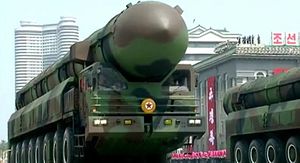It hasn’t been a good week for allied reassurance in Northeast Asia for the United States. I wrote last week about how Trump damaged the alliance with off-the-cuff suggestions that South Korea ought to cough up $1 billion for the Terminal High Altitude Area Defense (THAAD) system and that the South Korea-U.S. Free Trade Agreement (KORUS) should be renegotiated. Things haven’t improved much since then. Despite U.S. National Security Adviser H.R. McMaster’s attempts to control the damage over the weekend, Trump likely aggravated matters when he told Bloomberg on Monday that he would be “honored” to meet Kim Jong-un, the authoritarian leader of a regime in North Korea responsible for untold human suffering and rights abuses.
In all the sound and the fury over the last few days, however, there’s one particular remark that I think merits closer scrutiny. The source here wasn’t Trump, but McMaster. In his appearance on Fox News to walk back Trump’s suggestions for South Korea to pay for THAAD, the U.S. national security adviser was asked about a possibility of a nuclear strike on Seoul. He responded that what “the president has first and foremost on his mind is to protect the American people.” That remark might seem innocuous and, indeed, realistic, but it stands to raise serious doubts in both Seoul and Tokyo that American extended deterrence commitments are unreliable amid an ever-growing nuclear threat from North Korea.
This gets at what’s known as the “decoupling” problem. During the Cold War, once the Soviet Union flight-tested and incorporated a massive arsenal of intercontinental ballistic missiles, holding the U.S. homeland under constant threat, U.S. allies in Western Europe wondered if Washington’s strategic arsenal would serve as a credible deterrent against Soviet adventurism. If strategic escalation would leave the United States at direct risk of suffering a nuclear strike, would Washington commit to Bonn’s defense, potentially risking U.S. cities in the process?
These sorts of “decoupling” fears ebb and flow with the times and with the balance of conventional and strategic military power. In the East Asian case, while both Japan and South Korea have factored these issues into their strategic planning, never before has the atmosphere been so primed for a possibility of a major decoupling crisis. Before Trump entered office and started sending signals all over the place on North Korea, we’d seen a range of factors both positively and negatively affecting “decoupling” fears among these U.S. allies.
On the positive side, we had the optics of the “pivot” and “rebalance” to Asia under the Obama administration, an unflinching bipartisan consensus about the value of alliances, explicit assurances from Obama that disputed territories like the Senkaku/Diaoyu Islands fell under Article V of the U.S.-Japan treaty, and regular kinetic shows of U.S. resolve after North Korea missile and nuclear tests.
On the negative side, domestic U.S. political developments, like the imposition of sequestration in 2011, stoked concerns that the conventional balance of power in East Asia would erode from a status quo favoring the United States and its allies sooner rather than later. (Indeed, in the ensuing years, China’s breakneck pace of shipbuilding and other forms of military modernization have externally reinforced these concerns.) But broadly speaking, many of these pressures on the two major Northeast Asian alliances were managed and moderated by commitments elsewhere.
Had I written this reflection in February or March, I may have been more sanguine. Despite the lack of clarity back then toward North Korea, given the then-ongoing policy review, Tokyo and Seoul had fallen back on U.S. Defense Secretary Jim Mattis’ “reassurance tour.” Mattis said the right things, leaving both capitals with a sense that everything would be okay, at least in the short-term. Japanese Prime Minister Shinzo Abe’s trip to the United States managed to also steer clear of an alliance crisis.
In the coming months, it’ll be worth watching for signs of intensifying “decoupling” pressures in both capitals. In particular, with a week left before South Koreans vote in a new president and the state of the U.S. alliance a hot topic on the campaign trail, whoever wins will likely face public opinion constraints in how Trump is to be dealt with. And given that a left-leaning candidate favoring greater engagement with Pyongyang may come out on top, the effects may be felt for longer.
In Tokyo too, Abe may find that fears of a “decoupling” will actually abet his ongoing project to make a Japan a more “normal” country when it comes to military matters. But given the immediacy of the threat of a North Korean attack for Japan — authorities kicked off civilian evacuation exercises in a ballistic missile attack scenario earlier this year — short-term insecurity may spike if the Trump administration fails to reassure.
Complicating matters further, the triangular relationship could suffer immensely should “decoupling” fears in either Tokyo or Seoul grow acute. North Korea, for example, may sense an opportunity to exacerbate these pressures, putting Washington in a position where it would have to “choose” between its two allies (who don’t get along that well to begin with).
As a closing thought, if these “decoupling” fears in Seoul and Tokyo reach a new high under Trump, it won’t necessarily spell the end of the United States’ Asian alliances. In particular, total “decoupling” just doesn’t seem realistic — i.e., a North Korean ICBM threat is highly unlikely to coerce the United States into terminating its treaty commitments.
Nevertheless, Trump, in his own special way, has a gift for blurting out deceptively simple comments that lead to a sense of dread. One story from the presidential campaign trail had him asking a foreign policy expert three times why the United States can’t use nuclear weapons, for instance. So, perhaps we’re not far off from him wondering out loud in an interview why the United States, then, should be expected to give up New York, Los Angeles, or Boston for Seoul, Tokyo, or Busan.

































